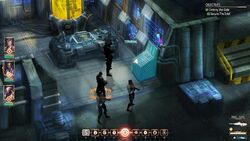The Codex Reviews Drox Operative
The Codex Reviews Drox Operative
Review - posted by JarlFrank on Wed 26 December 2012, 14:35:29
Tags: Drox Operative; Soldak EntertainmentDrox Operative is the newest game by indie developer Soldak Entertainment and, just like their previous efforts, is a Diablo-like Action RPG that tries to breathe some fresh air into its sub-genre. While Depths of Peril and Din's Curse were traditional fantasy RPGs with other actors competing with the player, Drox Operative goes one step further by being set in space and incorporating elements of 4x strategy games. Whether this actually manages to make the game feel dynamic and interesting, and whether the basic mechanics are solid enough to support the novel ideas, you can read in the following review!
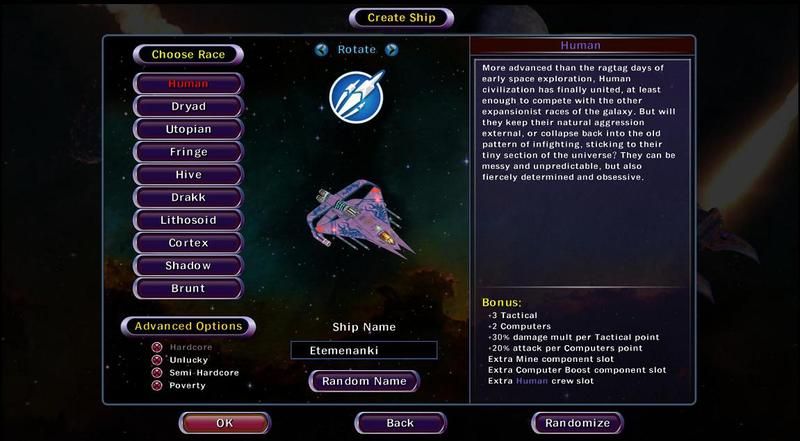
Diablo in space
At its core, Drox Operative is a Diablo-like ARPG. You fly through space, shoot down "monsters" (actually they are spaceships, but the game calls them monsters) for experience points and collect the loot they drop. Loot consists of ship components and the experience points are gathered not by any single character, but by your spaceship's crew, which has several stats that can be raised on levelup. Those stats are Tactical, Helm, Structural, Engineering, Computers and Command. Increasing stats raises your damage, attack, hitpoints or defense, depending on the stat, and allows you to install better components. A high quality supercomputer requires a high Computers stat in order to be installed, for example. Command differs from the other stats, however, in that it doesn't directly influence your ship's combat effectiveness, but rather determines the type of spaceship you command. If you raise your Command to a set value, your ship will be upgraded to a higher class, so rather than a small corvette you can now pilot a large battlecruiser with additional component slots. It is also the only stat that cannot be raised by components or specialist crew members.
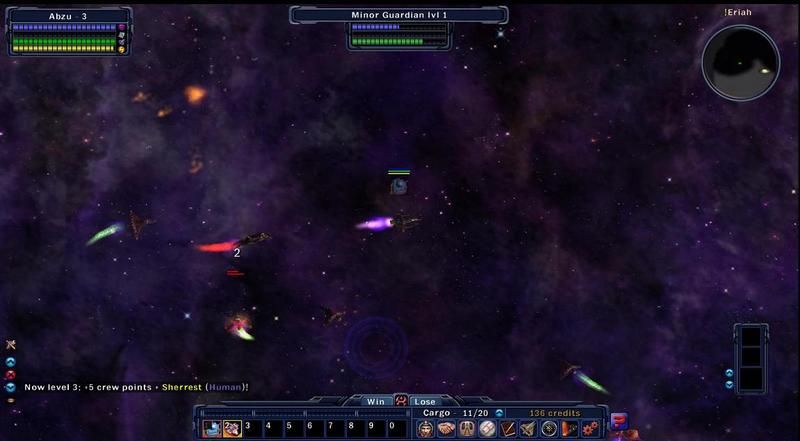
The equipment system, which is a very important element of any Diablo-like, is very well done in Drox Operative. There are three classes of components - light, medium and heavy - and you can freely choose which types of components you want to put on your ship. If you have four medium slots, you can put in two computers that increase attack and defense, and two powerful shields. Or you can only put in a single shield, a single computer and two thrusters for increased movement speed. It's a very flexible equipment system that lets the player customize his ship however he wants. But there are several things that have to be taken into consideration if you want your ship to be effective: there needs to be enough power to run all of the ship's components (every component other than generators consume power, while generators supply it), for if your components consume more than your maximum power load, your ship will suffer several penalties. You also need energy to fire your weapons, so a heavy-hitting weapon that consumes a lot of energy will be completely useless without enough batteries. Specialist crew members are also "components" that can be put into a light component slot and raise your ship's stats based on their abilities.
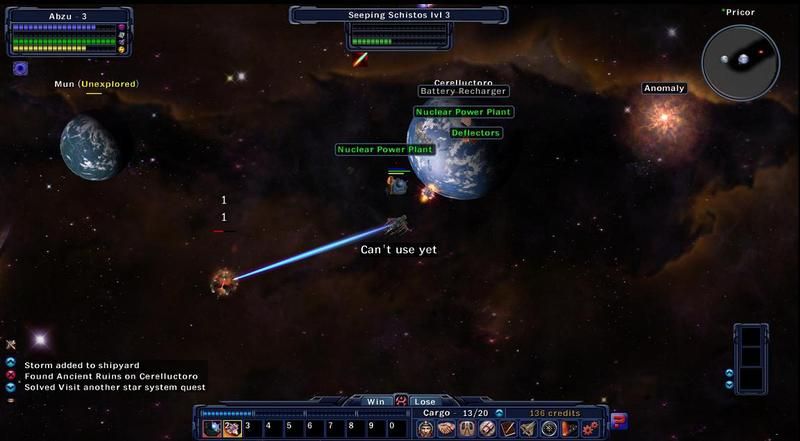
Another important element of Diablo-likes is the combat. And here, Drox Operative also doesn't disappoint. In Soldak Entertainment's previous games, Depths of Peril and Din's Curse, I found the combat to feel rather dull, slow-paced and un-dynamic, which dragged down these otherwise solid games. The combat in Drox Operative positively suprised me, as it's very dynamic and full of movement. Both you and your enemies will always be in motion, circling each other and trying to evade projectiles. There are many different weapon types that all have their own strengths and weaknesses: lasers are very accurate and fast-firing, but deal comparatively low damage; kinetic weapons do solid damage but can miss their target if it evades the shot; missiles are target-locked but can be shot down; bombs can be dropped in the path of enemies, do splash damage and are a great way to destroy mobs that are following you while you flee. When you also have to consider the amount of energy each weapon consumes with each shot, combat can be a very tactical affair. As I already mentioned, I was pleasantly surprised by Drox Operative's combat, and it's definitely a huge step forward from the combat in Soldak Entertainment's previous games.
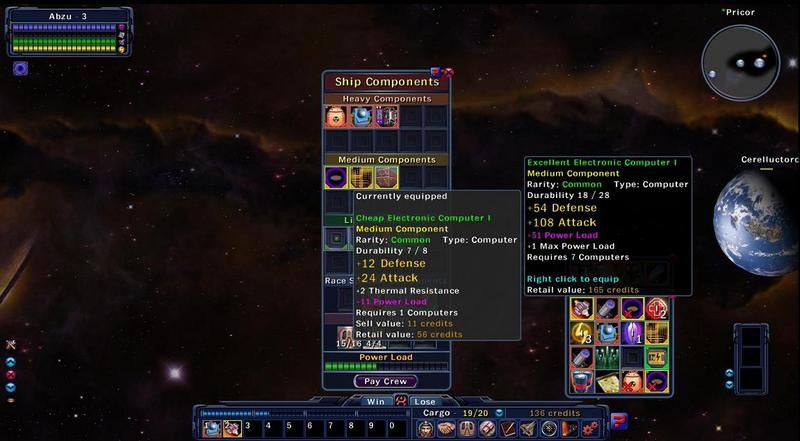
There is, of course, also a varied selection of races that you can play. Each race has its own spaceship design with different stat boni and additional race-specific component slots. A Human ship, for example, gets a bonus of 30% to attack for each stat point spent on the Tactical stat, while a Dryad ship gets a bonus of 20% on energy and energy regeneration for each point spent on Engineering. Beyond this, the choice of race matters little, though. You do not gain any positive or negative modifiers with other races based on which race your own crew is, and there are no skill-trees or anything that would have a larger effect on gameplay based on race. Every race's ships have the same abilities, some are just better at certain things than others.
Diablo meets Master of Orion
So, the basic gameplay elements are all quite solid. Combat is fluid and dynamic, the equipment system is interesting and there are varied equipment types, so killing shit and looting the remains is fun. But since this is a Soldak game, there has to be a twist to the classic Diablo formula. Drox Operative tries to create a dynamic world by adding elements of 4x strategy games in the form of different factions that colonize planets, build ships and compete with each other. You are playing as a Drox Operative; the Drox Operatives are something like a mercenary guild with a high reputation, independent from any government. The goal of the game is to achieve victory for the Drox Operatives by either forging an alliance with every civilization in this sector of the galaxy, making lots of money, or achieving a legendary reputation. In order to win the game, you need to interact with the different galactic empires that populate the sector.
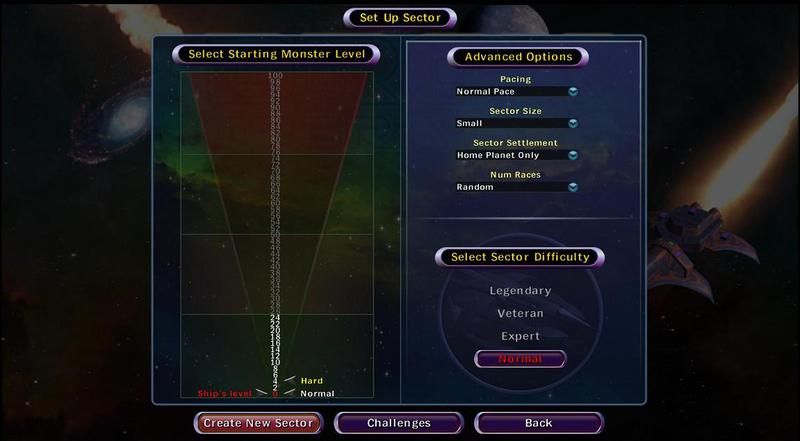
On the start of a new game, a map of a galaxy's sector is created and different civilizations are placed in it. These civilizations then go on to colonize space and compete with each other, forging alliances, trading technologies and going to war, just like you would expect from a 4X strategy game such as Master of Orion. The galaxy sector consists of multiple solar systems, each containing a jumpgate that allows for quick travel to any other solar system in the sector, starlanes that allow travel between two specific systems, and a couple of planets. The civilizations explore the galaxy on their own, founding new colonies in other solar systems and building an empire.
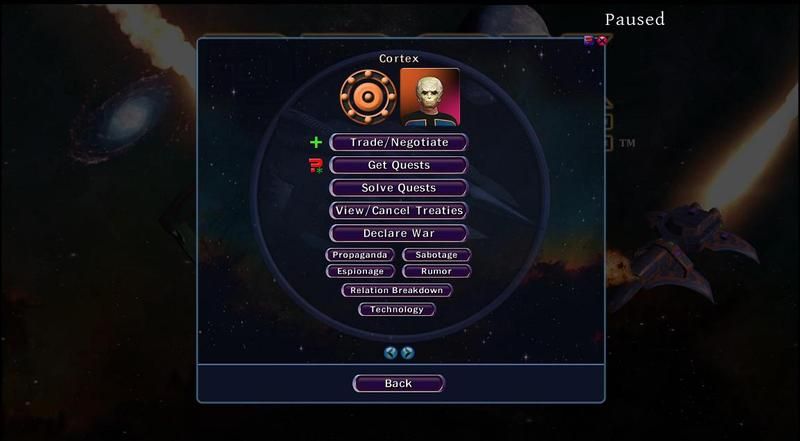
The player can do quests for these space empires, such as helping them colonize a planet (by equipping a colonization module and using it on the planet), defend planets from enemies, get rid of monsters, or fight enemy empires. Everything you do has an effect on your relations with the different empires: destroying ships of one empire will improve relations with all of its enemies, defending a planet from attackers will improve relations with the planet's owner, trading will improve relations with the faction you trade with, and so on. Once relations are good enough, you can enter a non-aggression pact or even forge an alliance - but beware, if an empire you are allied with goes to war, you will be dragged into it, too!
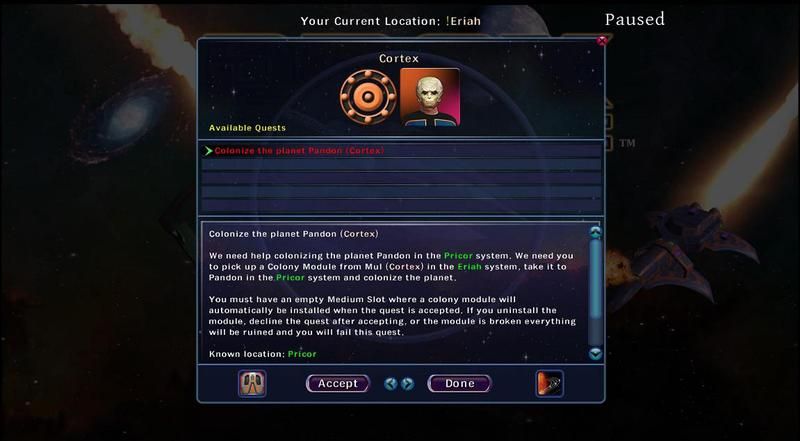
So basically, the different factions all play a game of Master of Orion against each other while you, the player, appear as a third party doing mercenary work for whoever pays you the most, and even involving yourself in politics by choosing allies and intervening in wars. You can also sell technologies and exploration data to the different factions - for a price, of course. If you enter a completely unexplored solar system, you can scan the planets and sell the information to every civilization you are in contact with. If you come into contact with a new civilization, you can sell the contact details to other civs. Information is a valuable commodity and you can sell it at high prices.
Space - The Final Frontier
But aparts from planets, starlanes and jumpgates, there are also other things of interest to discover in each solar system. From space junk that may contain valuable goodies over ancient recharge stations that can restore your shields to anomalies that can have any number of effects when scanned (you can find something valuable in an anomaly, or you might get damaged by radiation, or you might even discover an unstable wormhole that teleports you to another solar system with no return ticket), there are many things to discover for the avid space explorer.
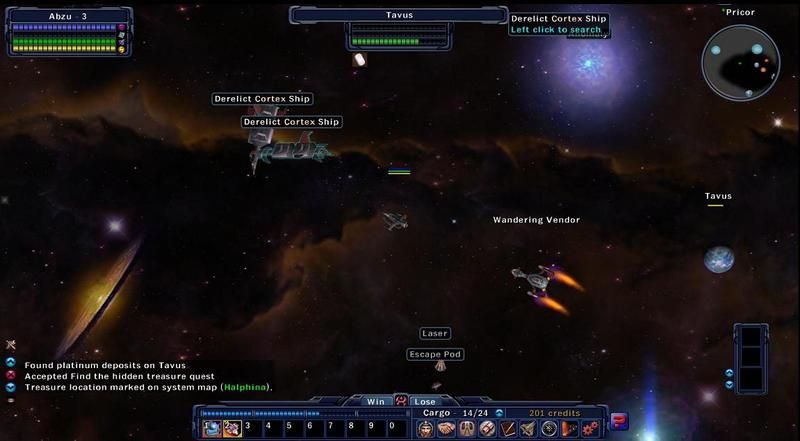
Exploring systems that aren't populated by any civilization is a lot closer to classic Diablo gameplay than the whole empire-interaction element. You inspect anomalies, scan planets and shoot down "monsters" to get their loot. When you've explored the entire sector, you sell the information you've gathered about the planets and then use the starlane to go to the next system. Starlanes, jumpgates and wormholes are the only ways to travel to other solar systems. If you just fly out of the solar system, a warning will appear that you are currently in empty space and that you will not find anything there. It's not possible to reach other systems by just flying there, which makes, considering the speed of spaceships in this game, sense. If it takes a minute to traverse a solar system, travelling between solar systems by conventional means just isn't feasible.
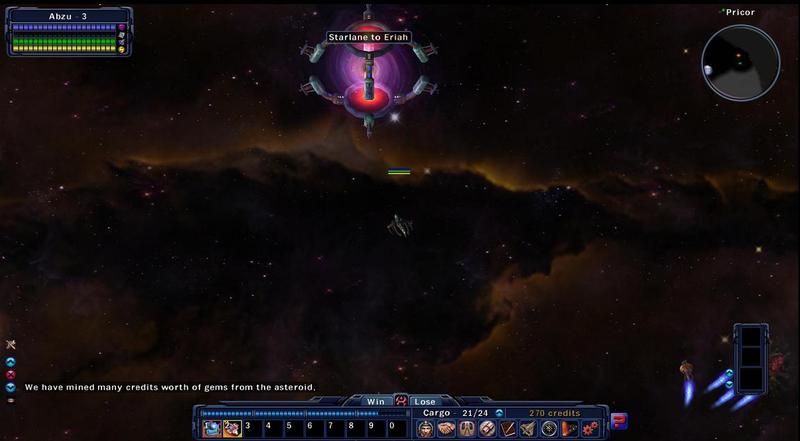
Jumpgates are by far the most convenient way of travel between systems. While starlanes and wormholes always connect specific systems, a jumpgate allows you access to any other system - if you have activated that system's jumpgate, that is. And jumpgates are something that the space empires use to get some money out of you. While you can sell them information about planets and new technologies, the empires themselves can sell you the jumpgate codes of systems they have colonized so you don't have to activate the gate yourself in order to use it. They also enact a fee for using gates that they control. This effectively means that travelling by jumpgate can be very expensive, depending on the relation with the controlling empire. Travelling into a system controlled by an ally can cost as little as 20 credits, while travelling into an enemy-controlled system will cost more than 500.
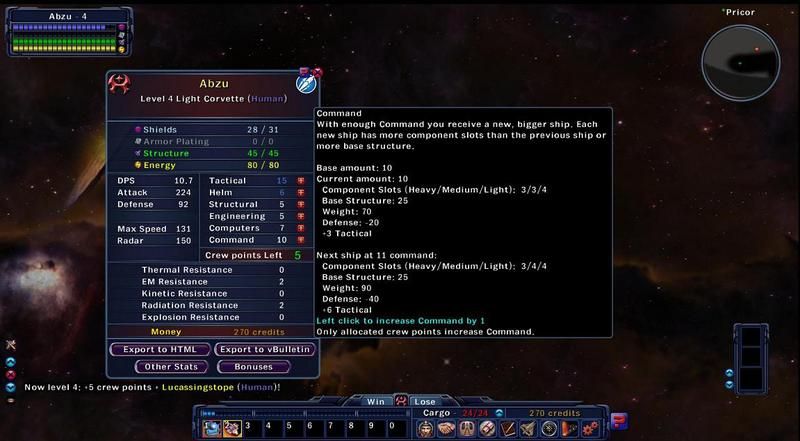
It is interesting to note that, even if you are at war with an empire, you can still trade with them. They will offer you much less money for your information than your allies would, but you can sell planetary data to someone you are at war with.
Diablo meets MoO in space, but it's basically still Diablo
In conclusion, I have to say that Drox Operative tries a fresh new approach to Diablo-like ARPGs and succeeds. At its core, however, it still is a Diablo-like. The 4X elements are just a backdrop to what is, basically, killing shit and gathering loot. You will do a lot of trading with the different space empires, you will do diplomacy with them, but 90% of the time you spend on Drox Operative you will be exploring solar systems and kill things for experience and loot.
Overall, I enjoyed playing Drox Operative - especially experimenting with different ship builds and trying out all the different weapons this game has. There never was any moment where I thought the game was amazing, quite the contrary - sometimes its shortcomings became all too apparent after a long gaming session (such as the relatively slow movement speed considering the size of the gameworld, the lack of enemy variety, and a very unstructured difficulty/level progression), but for some reason, the game managed to keep me on my chair for hours at a time. I start a session to play a little, and suddenly, three hours are gone. I blame it on the fact that it's a rather solid ARPG that attempts something that has never really been done before - putting the player into the world of a strategy game with competing factions and letting him interact with them in any way he likes.
I can heartily recommend this game to everyone who played and enjoyed any of the previous games by Soldak Entertainment. The basic principle is the same - a Diablo-like with a twist - and this is their most refined offering yet. If you enjoy Diablo-likes in general and want something that brings fresh ideas into the genre, you cannot go wrong with this, either. Anyone else should just try the demo and decide for themselves. It's a very solid game that tries something new, but it's nothing groundbreaking or breathtaking. It definitely is a much-needed breath of fresh air and shows that genre-mixing RPGs with strategy games can lead to very interesting results.

Diablo in space
At its core, Drox Operative is a Diablo-like ARPG. You fly through space, shoot down "monsters" (actually they are spaceships, but the game calls them monsters) for experience points and collect the loot they drop. Loot consists of ship components and the experience points are gathered not by any single character, but by your spaceship's crew, which has several stats that can be raised on levelup. Those stats are Tactical, Helm, Structural, Engineering, Computers and Command. Increasing stats raises your damage, attack, hitpoints or defense, depending on the stat, and allows you to install better components. A high quality supercomputer requires a high Computers stat in order to be installed, for example. Command differs from the other stats, however, in that it doesn't directly influence your ship's combat effectiveness, but rather determines the type of spaceship you command. If you raise your Command to a set value, your ship will be upgraded to a higher class, so rather than a small corvette you can now pilot a large battlecruiser with additional component slots. It is also the only stat that cannot be raised by components or specialist crew members.

The equipment system, which is a very important element of any Diablo-like, is very well done in Drox Operative. There are three classes of components - light, medium and heavy - and you can freely choose which types of components you want to put on your ship. If you have four medium slots, you can put in two computers that increase attack and defense, and two powerful shields. Or you can only put in a single shield, a single computer and two thrusters for increased movement speed. It's a very flexible equipment system that lets the player customize his ship however he wants. But there are several things that have to be taken into consideration if you want your ship to be effective: there needs to be enough power to run all of the ship's components (every component other than generators consume power, while generators supply it), for if your components consume more than your maximum power load, your ship will suffer several penalties. You also need energy to fire your weapons, so a heavy-hitting weapon that consumes a lot of energy will be completely useless without enough batteries. Specialist crew members are also "components" that can be put into a light component slot and raise your ship's stats based on their abilities.

Another important element of Diablo-likes is the combat. And here, Drox Operative also doesn't disappoint. In Soldak Entertainment's previous games, Depths of Peril and Din's Curse, I found the combat to feel rather dull, slow-paced and un-dynamic, which dragged down these otherwise solid games. The combat in Drox Operative positively suprised me, as it's very dynamic and full of movement. Both you and your enemies will always be in motion, circling each other and trying to evade projectiles. There are many different weapon types that all have their own strengths and weaknesses: lasers are very accurate and fast-firing, but deal comparatively low damage; kinetic weapons do solid damage but can miss their target if it evades the shot; missiles are target-locked but can be shot down; bombs can be dropped in the path of enemies, do splash damage and are a great way to destroy mobs that are following you while you flee. When you also have to consider the amount of energy each weapon consumes with each shot, combat can be a very tactical affair. As I already mentioned, I was pleasantly surprised by Drox Operative's combat, and it's definitely a huge step forward from the combat in Soldak Entertainment's previous games.

There is, of course, also a varied selection of races that you can play. Each race has its own spaceship design with different stat boni and additional race-specific component slots. A Human ship, for example, gets a bonus of 30% to attack for each stat point spent on the Tactical stat, while a Dryad ship gets a bonus of 20% on energy and energy regeneration for each point spent on Engineering. Beyond this, the choice of race matters little, though. You do not gain any positive or negative modifiers with other races based on which race your own crew is, and there are no skill-trees or anything that would have a larger effect on gameplay based on race. Every race's ships have the same abilities, some are just better at certain things than others.
Diablo meets Master of Orion
So, the basic gameplay elements are all quite solid. Combat is fluid and dynamic, the equipment system is interesting and there are varied equipment types, so killing shit and looting the remains is fun. But since this is a Soldak game, there has to be a twist to the classic Diablo formula. Drox Operative tries to create a dynamic world by adding elements of 4x strategy games in the form of different factions that colonize planets, build ships and compete with each other. You are playing as a Drox Operative; the Drox Operatives are something like a mercenary guild with a high reputation, independent from any government. The goal of the game is to achieve victory for the Drox Operatives by either forging an alliance with every civilization in this sector of the galaxy, making lots of money, or achieving a legendary reputation. In order to win the game, you need to interact with the different galactic empires that populate the sector.

On the start of a new game, a map of a galaxy's sector is created and different civilizations are placed in it. These civilizations then go on to colonize space and compete with each other, forging alliances, trading technologies and going to war, just like you would expect from a 4X strategy game such as Master of Orion. The galaxy sector consists of multiple solar systems, each containing a jumpgate that allows for quick travel to any other solar system in the sector, starlanes that allow travel between two specific systems, and a couple of planets. The civilizations explore the galaxy on their own, founding new colonies in other solar systems and building an empire.

The player can do quests for these space empires, such as helping them colonize a planet (by equipping a colonization module and using it on the planet), defend planets from enemies, get rid of monsters, or fight enemy empires. Everything you do has an effect on your relations with the different empires: destroying ships of one empire will improve relations with all of its enemies, defending a planet from attackers will improve relations with the planet's owner, trading will improve relations with the faction you trade with, and so on. Once relations are good enough, you can enter a non-aggression pact or even forge an alliance - but beware, if an empire you are allied with goes to war, you will be dragged into it, too!

So basically, the different factions all play a game of Master of Orion against each other while you, the player, appear as a third party doing mercenary work for whoever pays you the most, and even involving yourself in politics by choosing allies and intervening in wars. You can also sell technologies and exploration data to the different factions - for a price, of course. If you enter a completely unexplored solar system, you can scan the planets and sell the information to every civilization you are in contact with. If you come into contact with a new civilization, you can sell the contact details to other civs. Information is a valuable commodity and you can sell it at high prices.
Space - The Final Frontier
But aparts from planets, starlanes and jumpgates, there are also other things of interest to discover in each solar system. From space junk that may contain valuable goodies over ancient recharge stations that can restore your shields to anomalies that can have any number of effects when scanned (you can find something valuable in an anomaly, or you might get damaged by radiation, or you might even discover an unstable wormhole that teleports you to another solar system with no return ticket), there are many things to discover for the avid space explorer.

Exploring systems that aren't populated by any civilization is a lot closer to classic Diablo gameplay than the whole empire-interaction element. You inspect anomalies, scan planets and shoot down "monsters" to get their loot. When you've explored the entire sector, you sell the information you've gathered about the planets and then use the starlane to go to the next system. Starlanes, jumpgates and wormholes are the only ways to travel to other solar systems. If you just fly out of the solar system, a warning will appear that you are currently in empty space and that you will not find anything there. It's not possible to reach other systems by just flying there, which makes, considering the speed of spaceships in this game, sense. If it takes a minute to traverse a solar system, travelling between solar systems by conventional means just isn't feasible.

Jumpgates are by far the most convenient way of travel between systems. While starlanes and wormholes always connect specific systems, a jumpgate allows you access to any other system - if you have activated that system's jumpgate, that is. And jumpgates are something that the space empires use to get some money out of you. While you can sell them information about planets and new technologies, the empires themselves can sell you the jumpgate codes of systems they have colonized so you don't have to activate the gate yourself in order to use it. They also enact a fee for using gates that they control. This effectively means that travelling by jumpgate can be very expensive, depending on the relation with the controlling empire. Travelling into a system controlled by an ally can cost as little as 20 credits, while travelling into an enemy-controlled system will cost more than 500.

It is interesting to note that, even if you are at war with an empire, you can still trade with them. They will offer you much less money for your information than your allies would, but you can sell planetary data to someone you are at war with.
Diablo meets MoO in space, but it's basically still Diablo
In conclusion, I have to say that Drox Operative tries a fresh new approach to Diablo-like ARPGs and succeeds. At its core, however, it still is a Diablo-like. The 4X elements are just a backdrop to what is, basically, killing shit and gathering loot. You will do a lot of trading with the different space empires, you will do diplomacy with them, but 90% of the time you spend on Drox Operative you will be exploring solar systems and kill things for experience and loot.
Overall, I enjoyed playing Drox Operative - especially experimenting with different ship builds and trying out all the different weapons this game has. There never was any moment where I thought the game was amazing, quite the contrary - sometimes its shortcomings became all too apparent after a long gaming session (such as the relatively slow movement speed considering the size of the gameworld, the lack of enemy variety, and a very unstructured difficulty/level progression), but for some reason, the game managed to keep me on my chair for hours at a time. I start a session to play a little, and suddenly, three hours are gone. I blame it on the fact that it's a rather solid ARPG that attempts something that has never really been done before - putting the player into the world of a strategy game with competing factions and letting him interact with them in any way he likes.
I can heartily recommend this game to everyone who played and enjoyed any of the previous games by Soldak Entertainment. The basic principle is the same - a Diablo-like with a twist - and this is their most refined offering yet. If you enjoy Diablo-likes in general and want something that brings fresh ideas into the genre, you cannot go wrong with this, either. Anyone else should just try the demo and decide for themselves. It's a very solid game that tries something new, but it's nothing groundbreaking or breathtaking. It definitely is a much-needed breath of fresh air and shows that genre-mixing RPGs with strategy games can lead to very interesting results.











